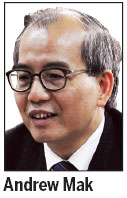Hong Kong may have a role in EU-China solar panel dispute
Updated: 2013-07-17 06:20
By Andrew Mak(HK Edition)
|
|||||||
The recent dispute over solar panels between the European Union and China is of a huge scale in international trade dispute terms but appears not worth the fight for either side. The question appears to be whether and how this kind of dispute may be efficiently resolved to the satisfaction of all sides. The legal profession in Hong Kong may have a role to play.
Last Friday it was reported that efforts by the EU and China to settle a dispute over the export of solar panels from China to the EU had hit an impasse, threatening to heighten tensions between two of the world's largest trading partners.
In the past few weeks, the two sides had been hoping to settle the matter, in which Chinese exporters would agree that instead of paying punitive tariffs, they would agree not to sell their products in the EU below an agreed minimum price. At the moment the deadline is Aug 6, after which the EU would increase anti-dumping duties on imported Chinese solar products from 11 percent to an average of 47 percent.
In May the EU trade chief was pushing to impose provisional duties of 40 percent on Chinese solar panels in a move that risks stirring wider trade tensions with China. The figure was arrived at after alleging that Chinese manufacturers had gained from illegal government subsidies and then dumped their products - or sold them below cost. The amount involved was huge. Some 21 billion euros ($27.5 billion) in Chinese solar products were exported to Europe in 2011.

In this case it was the German manufacturer of photovoltaic cells and panels, Solar World, who lodged the complaint. It is necessary to look into the culture of this company. Reportedly it had lost some 500 million euros in 2012 and was negotiating with creditors last week to restructure its debts. The company had won a case in the US last year, contending that Chinese competitors had used illegal government subsidies, including cheap financing. This resulted in undercutting on pricing and taking over more than 80 percent of the EU solar panel market, the world's largest, it said.
However, the plan to impose duties has met with frantic opposition from other elements of the European solar industry, which have benefited from inexpensive Chinese products. It's not just consumers but also the many small companies that had been installing panels on roofs and homes. One example was Wacker Chemical, a key supplier of polysilicon, the main ingredient in photovoltaic cells, which had warned that higher duties will hurt the industry and cost more European jobs than they save. The complaint was that prices would be artificially increased by punitive tariffs so that the European solar market would simply come to a standstill. All of this would have disastrous effects on "green jobs".
It is true that if provisional duties are approved and imposed, EU member states would not have the opportunity to overturn them in timely fashion. The process for the full investigation will only be completed in several months' time. This would be most unsatisfactory.
The possibility that is being explored under EU law is a "price undertaking". This envisaged exporters petitioning the commission to agree a minimum price below which they would not sell their products in Europe. If companies believed duties were inevitable, such an outcome would at least allow them to pocket higher prices rather than paying penalties to the commission. Those penalties would eventually benefit the competitors.
A good reason why China wants to settle the matter is that the solar case has been a focal point of worsening EU-China trade relations for the last 12 months.
It is clear to both the EU and China that such measures will be detrimental to both sides. A counter argument to anti-dumping measures is apparently that the EU's problem was not unfair trade. It was just the lack of industrial competitiveness.
It may be noted that the solar case is the EU's largest-ever trade case, in terms of the value of the goods at stake. This case had reportedly prompted China to retaliate by launching its own trade investigation into European wines, a most unfortunate incident.
How would Hong Kong feature in this kind of dispute? It may be thought that this matter presents the best opportunity for either arbitration or mediation to take place in Hong Kong. Hong Kong is now probably the best place in the region to accommodate either arbitration or the mediation processes. Interestingly it has no duty on wines. The parties can enjoy perhaps duty-free wine when they are trying to figure out what the best settlement terms would be for the good of both sides.
The author is a HK barrister and chairman of the Hong Kong Bar's Special Committee on Planning and Policy.
(HK Edition 07/17/2013 page9)